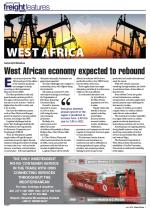Economic prospects for West Africa look good if the effects of the Covid-19 pandemic are managed correctly, according to the International Monetary Fund (IMF).The latest prediction is that real gross domestic product growth in the region will increase from -2.9% this year to 3.8% in 2021 – which is higher than the 3.6% in 2019, and 3.4% in 2018.
For more diversified economies, such as Côte d'Ivoire and Senegal, growth is expected to remain positive in 2020, according to the IMF.Logistical challenges lead the three “key” challenges identified for West Africa by the Organisation for Economic Cooperation and Development (OECD).
“First, the disruption in global supply chains will rapidly impact economies across the region. Second, measures that governments are taking to contain the virus – such as border closures, travel bans, and restrictions on movement – will create significant disruption for people, businesses and government agencies.”
The third challenge is the collapse in commodity prices, with Nigeria being the hardest hit.Oil makes up almost 90% of its total export earnings, according to the Organisation of Petroleum Exporting Countries (Opec).
Growth is, however, expected to recover to 2.6% in 2021, with rising oil prices and increasing production.Similarly, low cotton prices could affect the income of millions of households in Benin, Burkina Faso, Côte d’Ivoire, Mali, a n d To g o . In Côte d’Ivoire, Ghana and other coastal countries, the incomes of coffee, cocoa and cashew nut producers could also fall due to a decrease in global demand.
Logistics chains will be directly affected as volumes will be down, predict the authors of an OECD study into the effects of the virus.Food supply chains face major disruption, particularly in urban areas, which are the most affected.It is estimated that about 45% (or 133 million) of the West African population now lives in cities.
“Supply chains rely heavily on human capital, including small-holder farmers, herders, seasonal workers, traders, middlemen, wholesalers, processors, and transporters who work together to bring food from farm gates to consumer plates. “Furthermore, border closures, travel bans and restrictions on movement can lead to difficulties in buying agricultural inputs, selling products, and accessing markets, leading to severe drops in food production and market disturbances,” reads the report.With 80% of food consumed transiting through markets, the Covid-19 restrictions have a direct effect on food security.
Even without Covid, the quality of road infrastructure, markets, transportation and other supply chain systems present major challenges for food security in cities. Another 50 million are at risk in a region where 2.5 million children under five are malnourished.This could lead to further instability in a region where some 7.5 million people are already dependent on humanitarian assistance for survival. Armed groups are targeting schools, forcing health centres to close, and depriving communities of critical services across Burkina Faso, Mali and western Niger.
The Economic Community of West African States (Ecowas) has established a Conf lict Prevention Framework to address the instability of the region.

